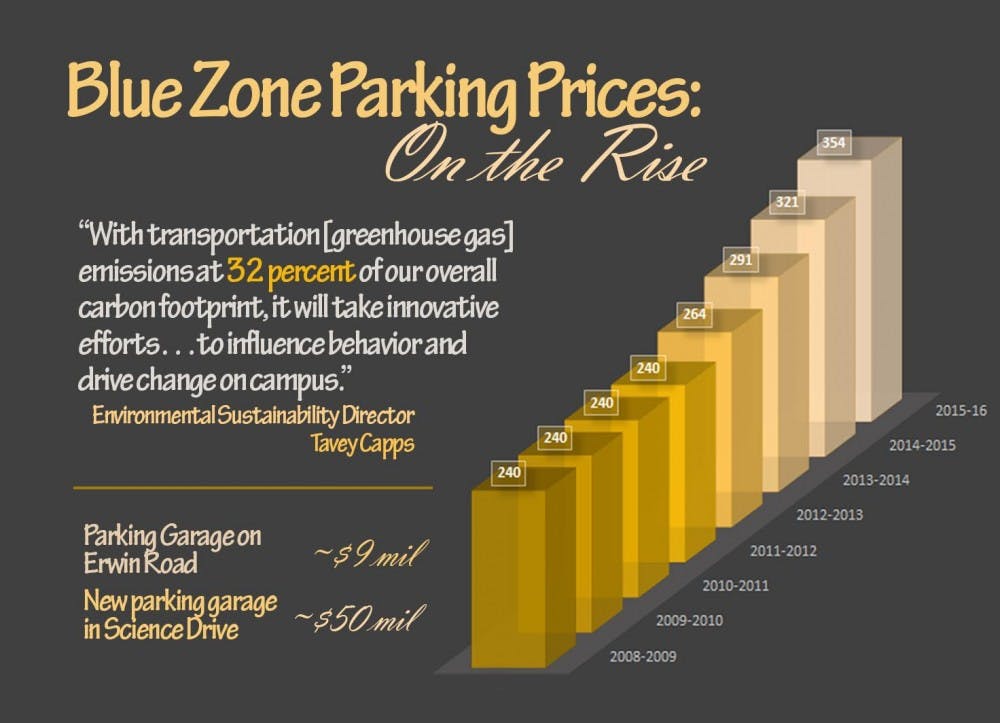The prices of parking permits at Duke have increased recently to support the costs of construction and environmental concerns.
Since the 2010-11 academic year, the price of an annual Blue Zone parking permit has increased by more than 33 percent from $240 to $321, after a period from 2008 to 2012 when prices remained relatively constant. The price of a Blue Zone permit is expected to increase again to $354 during the upcoming year.
This increase has come partially as a result of multi-million dollar projects to renovate parking spaces in the Medical Center and to construct a new parking garage on the corner of Cameron Boulevard and Science Drive, Vice President of Administration Kyle Cavanaugh said. Concerns about the environmental impact of cars have also contributed to the price hikes.
“Increasingly, we’re taking a very comprehensive and strategic view of parking,” Cavanaugh said. “[We’re] balancing a number of different issues, not only the financial aspects of parking, but dealing with issues of accessibility for mobility impaired individuals and also looking at how it fits into our sustainability efforts as well.”
The parking system is financially self-sustaining and does not seek to make a profit, Cavanaugh explained. As a result, all costs for renovations and for construction of new parking garages are paid through permit fees.
“In developing an economic model for parking you have to develop a revenue stream that’s going to cover the expenses,” he said. “If there’s deferred maintenance or potential expansion, all of those costs go into the expense side.”

Some of those expenses include major projects to improve existing parking garages and build new ones. The renovation of Parking Garage II on Erwin Road, which included significant maintenance work and the installation of LED lighting, cost about $9 million, Cavanagh noted. In addition, the new parking garage being built on Science Drive near the Fuqua School of Business will likely cost more than $50 million. Cavanaugh said that these costs, along with other maintenance and expansion costs incurred due to rising demand for parking spaces, will be built into permit fees.
But Duke is also considering the environmental impact of having more cars on campus.
The University has been working to reduce the number of cars on campus and has a goal of achieving a five percent reduction in the number of non-carpool vehicles on campus by 2018, Environmental Sustainability Director Tavey Capps wrote in an email.
“With transportation [greenhouse gas] emissions at 32 percent of our overall carbon footprint, it will take innovative efforts…to influence behavior and drive change on campus,” Capps wrote.
One way the University is hoping to do this is by expanding alternative transportation options both around campus and in Durham. The University is working with the City of Durham to modify the Bull City Connector route so that it is more useful for students and University employees, Cavanaugh said. He added that modification to campus bus routes and expansions of ride sharing and biking programs could also help to provide transportation options.
The University is also taking environmental concerns into account as it determines prices for parking permits. Although environmental concerns are not a major driver of permit costs, Cavanaugh noted that Duke does use them as a factor when determining the cost of parking.
“There are those that want us to be more aggressive in our pricing, because there’s at least some thought that pricing is one of the determinants to get people to seriously consider alternative options," Cavanaugh said.
Rises in parking permit prices have generally not been well received by students, although parking rates at Duke are much lower than at other peer institutions located in more urban settings.
Joel Luther, Trinity '15, expressed frustration that undergraduate students parking on campus are often asked to move their cars or park further away even though they are paying more for a permit each year.
"If there's something that happens and someone needs to be displaced, undergraduates are the first to go," he said. "When they renovated Baldwin and decided that they needed more parking for Baldwin, instead of making people park in Smith Warehouse and shuttle over to Baldwin for the performances, they make freshmen park in Smith Warehouse and walk over to the dorms, which is a massive inconvenience."
A number of students also expressed concerns that increases in parking prices may disproportionately impact students on financial aid, which does not cover the cost of a parking permit. Senior Luke Maier noted that not being able to park can cut lower income students off from opportunities that having a car provides.
“Last semester, I would not have been able to work at my lab (located off-campus) without a car,” he wrote in an email. “Raising parking prices closes these opportunities to students who are already at the edge of their financial envelope.”
Luther expressed similar sentiments, and noted that working off campus became increasingly difficult for him as parking prices rose.
"For students like me who come from less privileged backgrounds who want to have that opportunity to work, it's becoming increasingly difficult because parking prices continue to rise," he said. "Students from more privileged backgrounds can just pay the parking fee and maybe grumble a little bit, but it's not a huge inconvenience."
Cavanaugh argued that the concerns of financial aid students are not all that different from those of other students when it comes to parking costs.
“I think it’s no different than the general uncomfortableness of anyone paying for parking,” Cavanaugh said. “I think that folks would prefer that there be no cost for this, but the challenge that exists is that it unfortunately costs a fair amount of money to provide this, not only in our environment but in almost any other environment that exists, so it is a necessary evil.”
Amrith Ramkumar contributed reporting.
Get The Chronicle straight to your inbox
Signup for our weekly newsletter. Cancel at any time.

